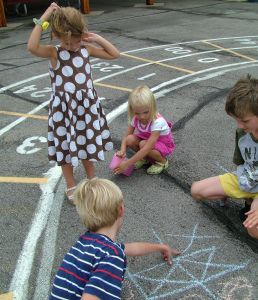By Rita Brhel, managing editor & API leader
 I am quite happy with the preschool that my children attended, although it took a lot of interviewing teachers and visiting sites, and a bit of trial-and-error, to find a program that I agree with. And now that my daughter is entering Kindergarten, I wonder if we will begin the process of finding an appropriate, like-minded school all over again?
I am quite happy with the preschool that my children attended, although it took a lot of interviewing teachers and visiting sites, and a bit of trial-and-error, to find a program that I agree with. And now that my daughter is entering Kindergarten, I wonder if we will begin the process of finding an appropriate, like-minded school all over again?
A major concern of mine about organized school programs outside the home is the lack of child-led play offered. The preschool programs that I turned down for my children were focused so narrowly on teaching reading, writing, and math for “school preparation” that they missed the best learning opportunities provided by a child’s natural inclination to explore. Preschoolers are wired to learn through play, not through deskwork.
Nicole Polifka, MEd, Head of Early Childhood Professional Development at the Minnesota Children’s Museum in Saint Paul, Minnesota, USA, shares my concern, adding that even childcare programs designed for infants and toddlers are increasingly becoming more geared toward academic testing and orienting away from free play.
“Play is very complex,” Polifka explained. “A very big difference between promoting intelligence in a child and just promoting academics: With the latter, there is a lot more they need to learn.”
Teachers tend to view play and learning as opposing forces when in fact they are synonymous for children, she said: “Play and learning are partners, not competitors. Learning is a whole-body experience. Learning by doing creates a ton of positive things for the brain.” Continue reading Playful Learning